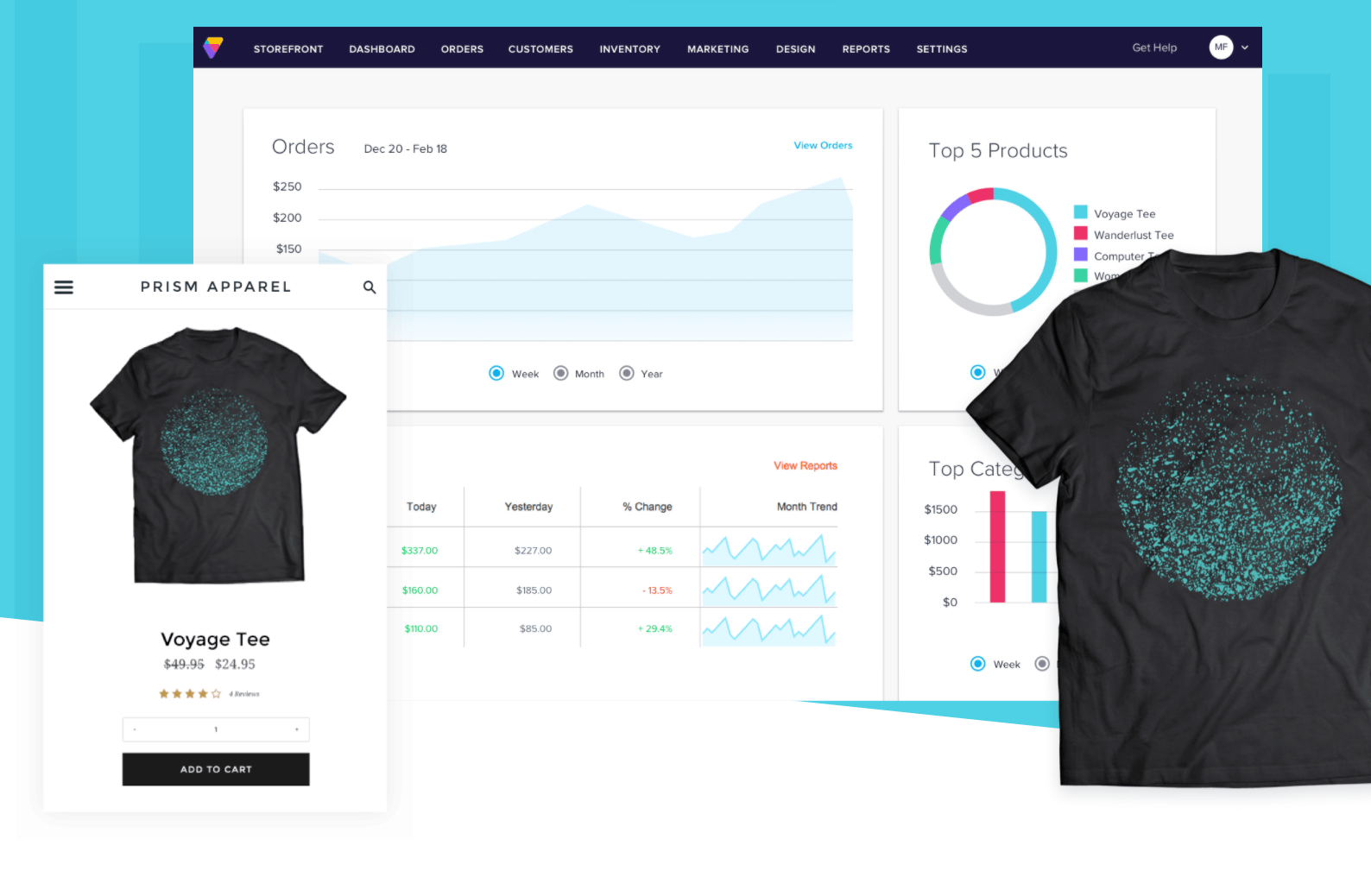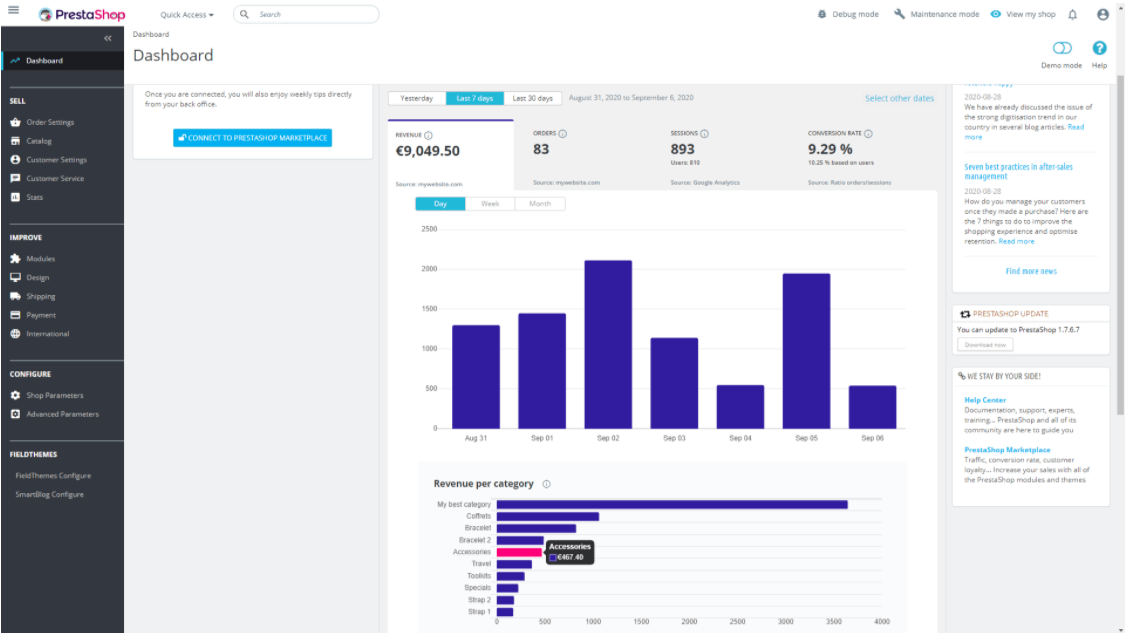7 Best Shopify Alternatives: Your Other Options Compared
By Rodney Laws | Ecommerce

Shopify is one of the most popular ecommerce platforms, used by thousands of retailers around the world, but there are plenty of other platforms out there and many reasons to use an alternative to Shopify.
In the guide below, we take a look at seven of the best Shopify alternatives to help you decide which one is the best fit for your online retail store:
If you’ve done any kind of research into different ecommerce options, then you’re bound to have come across Shopify. It’s one of the best known platforms out there — it’s incredibly easy to set up, and provides all the tools that you need to establish and grow an ecommerce business.
However, it does have certain limitations that mean it’s not the best choice for all retailers looking to set up an online store.
While Shopify provides templates for stores that can be customised — which are great for getting started quickly — you might want to do more with the design or add extra features to your website that Shopify doesn’t support.
You also need to consider and prioritise customer experience when choosing a platform. If you want your site to have a more creative or advanced design, then you might be better off looking for alternatives to Shopify or creating your own custom website.
It’s also worth bearing in mind the cost of Shopify. The initial monthly fees are fairly reasonable but as you start to use more apps to add more functionality to your site, you’ll have to pay additional monthly fees — and these can quickly add up to a very significant amount.
For small businesses just starting out online, it could be worth considering one of the more affordable or free Shopify alternatives.
There are a lot of Shopify alternatives to choose from.
Some offer more advanced features, some are more suitable for smaller or larger businesses, and there are also a number of free Shopify alternatives.
Below we’ve outlined some strong options that are worth considering:

Image: BigCommerce
BigCommerce is a highly versatile ecommerce platform, and their Enterprise platform is ideal for larger businesses with lots of products. They do offer an Essentials platform with three pricing tiers, but these are quite expensive.
This platform gives you everything you need to create a great online store, with multiple options to choose from with each element — although this may overcomplicate the setup. There are only a few free themes, so if you want something more unique you’ll need to pay for a premium one.
BigCommerce is also good if you’re selling on other platforms as well. You can manage stores on Amazon, eBay. and several other channels all through BigCommerce.
BigCommerce does have some similar cons to Shopify, so you need to consider whether it’s worth the more complicated setup, and how much value you’ll get from the additional features.
However, for big ecommerce stores, the product management capabilities are going to be far better than Shopify. One thing you do need to be careful about is moving up into the next price plan as your sales increase.

Image: Volusion
Volusion is a popular ecommerce platform for smaller or growing companies with some technical knowledge.
Pricing plans start at $29 per month, which is similar to other platforms, but this only allows for 100 products, and also has limitations on turnover, user accounts, and access to features.
If you have some technical and coding skills or you’re willing to pay a developer, then Volusion offers a lot of potential. It also provides a lot of features and tools that will help with marketing your ecommerce store and increasing sales. However, you need to consider the impact that not having a fully integrated blog might have on your content marketing plans.

Image: Squarespace
Squarespace isn’t just an ecommerce platform for traditional online retailers — it’s a website builder that offers functionality for artists, musicians, and bloggers to monetise their businesses.
It’s fairly easy to set up, with a wide range of plugins, and no limit on the number of products you can sell. It also offers one of the best blogging tools of all the Shopify alternatives listed here.
Squarespace offers all the key ecommerce functionality that you’ll need to set up an online store and it’s very easy to get started.
It’s a good Shopify alternative for retailers looking to use a simple tool to get started with — however, some of the limitations might be frustrating for growing ecommerce businesses.

Image: Wix
Wix is another popular website builder, and for ecommerce businesses, it offers a very accessible platform for creating an online shop. It has 100 different templates, which are all customisable, and a big range of apps and plugins for adding live chat, payment systems, coupons, and anything else you might need.
It’s really easy to get started with the Wix ecommerce website builder. You can either use an automated assistant that creates a site based on how you answer a series of questions, or you can use the Wix Editor for more control over the website building process.
Wix is a good value Shopify alternative that offers a really easy store builder and a lot of useful features that growing businesses will use.
On the downside, it’s not quite as customisable as Shopify, and it doesn’t integrate with as many other tools and software.
It’s also worth noting that Wix used to have a bad reputation when it came to SEO, but it seems that they’ve resolved this now — so it is possible to rank with a Wix website.

Image: Magento
The Magento platform is free like WooCommerce, and you have to pay for hosting, themes, and plugins. It offers a lot of potential, especially for larger ecommerce businesses or stores that are looking to scale.
However, it’s not as easy to set up as Shopify, or the other Shopify alternatives listed here. If you don’t have some fairly good technical skills then you’re going to need to hire a developer to get your ecommerce store up and running using Magento.
The community version of Magento is free, but it does mean that you have to set up and develop it yourself. Otherwise, you can pay for the Enterprise Edition which gives you access to support from Magento developers — but costs a considerable amount.
If you sign up to Magento now you’ll be using Magento 2, which offers improved speed, is more SEO friendly, and has better checkout systems than Magento 1.
Magento is the best alternative to Shopify if you’re looking to have complete control and flexibility over the design and functionality of your store. It’s probably not a good ecommerce platform for smaller businesses due to the amount of time and money you need to invest to get it set up.
If you’re just starting up an ecommerce business, or your store is fairly small, then you might be looking for free alternatives to Shopify.
There are a few options to choose from but the best two free Shopify alternatives are WooCommerce and PrestaShop, as they both offer enough functionality to run and grow a successful ecommerce store.
We go into them in further detail below:

Image: WooCommerce
WooCommerce is a plug-in to create an ecommerce store on a WordPress website. It has a lot of useful features for a very reasonable price. It’s effectively free — you just need to pay for hosting, domain, a theme, and any extra plugins you want to use. Many plugins are available for a one-time payment or annual cost, so they don’t add on to a monthly fee.
However, you do need to know your way around WordPress so it’s not that easy for beginners.
If you’re already familiar with WordPress then it’s definitely considering WooCommerce as a good alternative to Shopify. It offers a lot of the same functionality and it could work out cheaper than Shopify as well.
However, the lack of support from WordPress is something to be aware of — it’s not always easy to identify and fix any problems with your online shop.

Image: PrestaShop
PrestaShop is one of the best free alternatives to Shopify, although you do need to pay for hosting and buy a domain. Themes and templates aren’t as advanced as the ones that Shopify has but PrestaShop offers a lot of the features and functionality that smaller businesses are going to need, especially considering the pricing. There are no transaction fees and unlimited products and attributes.
For smaller ecommerce shops that are just starting out PrestaShop is one of the best free Shopify alternatives. It’s also a great option if you want to sell globally, with built-in multi-language functionality and multiple currency options available.
However, it doesn’t have a lot of features and add-ons that will make it easy to scale the business.
If you’re frustrated with Shopify’s limitations or costs and you want something different, then there are some great alternatives to Shopify out there.
These are the best Shopify alternatives, but it’s important to find the right one to suit your business and your future plans.
If you’re hoping to scale your business quickly then it’s important to consider a platform that offers more advanced features and can help you to grow. Many of these ecommerce platforms will offer a free trial so you can get a better understanding of how it will work for your store before you commit to it.